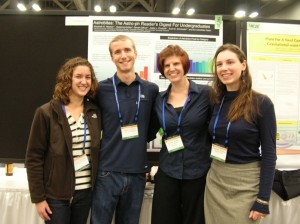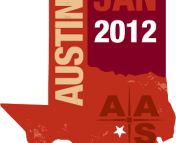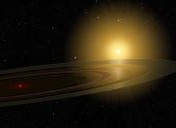This year, Astrobites will be liveblogging AAS. In order to avoid inundating our readers’ RSS feeds, we’ll be updating this post with short paragraphs about the talks we’ve heard and posters we’ve seen. So keep checking back throughout Monday afternoon! Earlier, we covered the Monday Morning sessions.

Happy astrobiters with our poster. From left to right: Evan Schneider, Dan Gifford, Susanna Kohler, Elisabeth Newton. Not pictured: Adele Plunkett, who was presumably off being awesome at the time of this photograph.
A side note
Thanks to everyone who stopped by the Astrobites poster today! We loved getting to meet you all in person, and getting to hear about your work as well as chat about ours.
3:40 PM The Challenges and Achievements in 50 Years of Human Space flight, Steven Hawley (University of Kansas)
Quoted in this talk:
“Anyone who sits on top of the largest hydrogen-oxygen fueled system in the world; knowing they’re going to light the bottom—and doesn’t get a little worried—does not fully understand the situation.”
— John Young, shuttle commander, after being asked if he was worried about making the first Space Shuttle flight.
2:30 PM – Press Release: SCIENCE SO FAR FROM LOFAR
LOFAR: The Low Frequency Array
Heino Falcke (MPI Für Radioastronomie/Radboud University/ASTRON, Germany)
Michael Wise (ASTRON, Netherlands Institute for Radio Astronomy)
First Results from the LOFAR Multifrequency Snapshot Sky Survey
George H. Heald (ASTRON, Netherlands Institute for Radio Astronomy)
Pulsars & Fast Transients with LOFAR
Jason Hessels (ASTRON, Netherlands Institute for Radio Astronomy)
LOFAR and the Epoch of Reionization
A. G. de Bruyn (ASTRON, Netherlands Institute for Radio Astronomy)
LOFAR (a multi-purpose sensor array which stands for the LOw Frequency ARray) is a new science project comprised of 200 astronomers from 40 institutes in several countries. LOFAR has components at stations in the Netherlands, Germany, Sweden, the UK and France. This press conference is to announce that LOFAR is working and capable of doing science, soon to be open to the general science community. Currently, 41 of 48 LOFAR component stations are working together! An interesting discussion at the press release related to radio frequency interference, considering that Europe is relatively “radio loud” due to its population density. Another question from the audience asked about the potential for SETI with LOFAR, with a response that it may be possible to conduct a SETI project, but no promise on when we should expect the paper. I’ll be looking for some interesting discoveries as LOFAR science progresses!
2:00pm – Career Paths: Alternatives to Academia
Panelists:
Dave Finley, Public Information Officer for the National Radio Astronomy Observatory; Job: Bring astronomy to the general public. Gives public lectures, tours of NRAO facilities, interfaces with news media. Communication skills and technical knowledge are key.
Rica Sirbaugh French, Mira Costa College and NASA Center for Astronomy Education; Job: Head of the astronomy department at Mira Costa Community College. Developed an astronomy program in an environment where students may have little or no scientific background.
Pat Slane, Harvard-Smithsonian Center for Astrophysics; Job: Head of the science mission planning team for the Chandra Observatory.
Nick Suntzeff, Texas A&M and the State Department; Job: Humanitarian Affairs Officer in the Office of Human Rights. Attends UN meetings, represents the United States. Having scientific thinkers in Washington is important, and doable.
Gautam Vasisht, Jet Propulsion Laboratory, California Institute of Technology; Job: Building astronomy instruments, particularly exoplanet instrument technology. Background in engineering and astrophysics.
Helpful Tips:
-When writing your CV, be sure to translate your skills into the language of your potential employer.
-No matter what the current technology is, being able to communicate well, to describe science in an interesting and accessible manner, will always be a valuable skill.
-The single most important thing you can do is networking, regardless of your field.




Trackbacks/Pingbacks